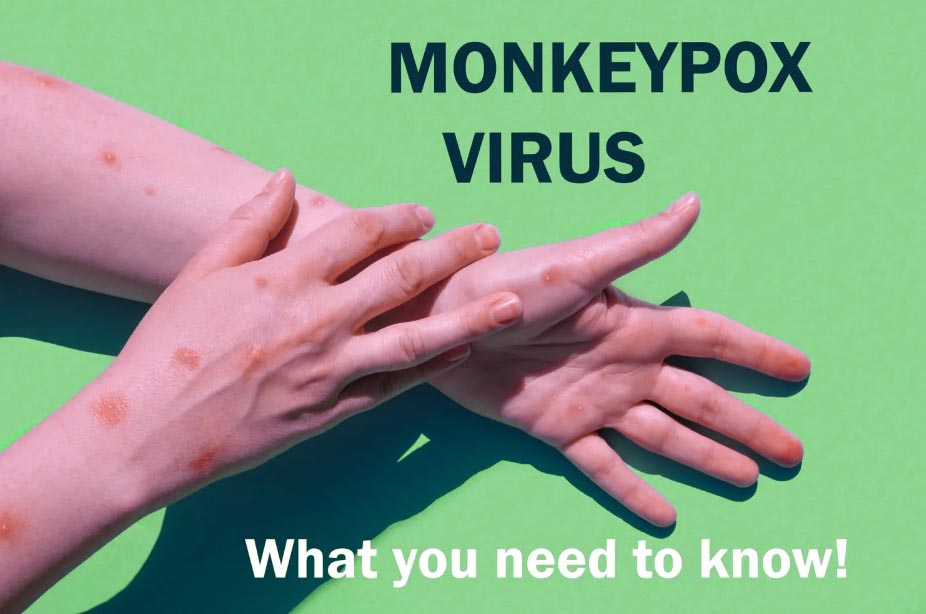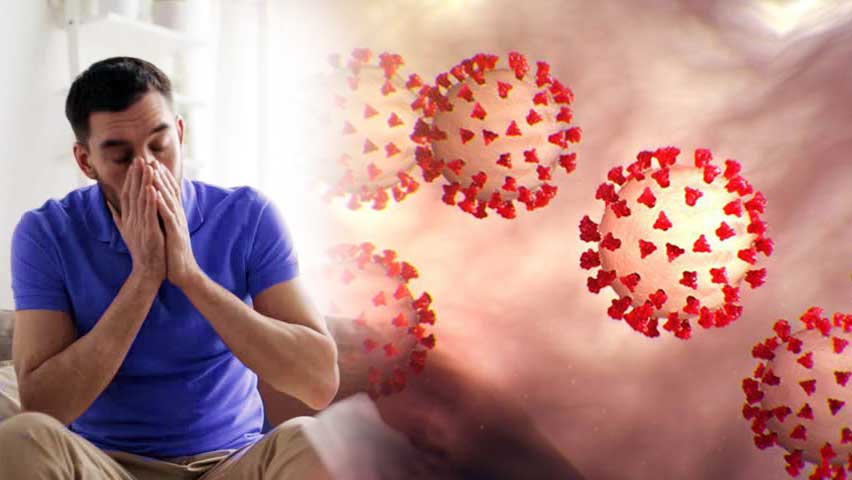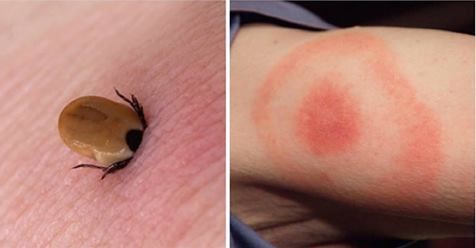Involves exposure to the skin lesions and/or body fluids of an infected person, which can happen when people are kissing or having sex.
“It’s usually not just contact in passing, but really close skin-to-skin contact, that’s the major risk to spread,” said Dr. Dan Shirley, medical director of infection prevention at UW Health.
Unlike COVID-19, small, aerosol droplets are not known to be a pathway through which monkeypox spreads, Graham and Shirley said.
Monkeypox is also not known to spread on everyday objects. In other words, as Graham explained, there is no need to sanitize your mail or wear gloves in the grocery store because you are worried someone with monkeypox touched your cart.
Some shared items can pose a risk of spread. Those include things that are used by people while they’re sick that could come into contact with their body fluids, like bedsheets on which a person with “weeping” lesions is sleeping, or their soiled clothes, used eating utensils, even unsanitized sex toys.
“We’d want to be careful around things that are soiled with their body fluids, blood, all that kind of stuff,” Shirley said.
What are the signs, symptoms?
The incubation period, during which a person can be infected but not have symptoms, can be one to two weeks.
After that, most people get monkeypox in one or two phases.
Some people experience symptoms that are “general and non-specific,” said Shirley. Those can include fever, fatigue, headache, muscle aches, chills and swollen lymph nodes.
A few days later, a rash develops. Usually, lesions start in a part of the body where the person was infected — often the anal or genital areas — or sometimes on the palms and soles. Then the sores can spread, with the potential to go all over the body, Shirley said. The lesions can be very painful.
Not everyone follows this progression. Some people get all the symptoms at once, or they only get the rash, according to Shirley and the state health department’s website.
Most people who have monkeypox recover on their own in two to four weeks, according to the state DHS.
Monkeypox patients remain infectious after their lesions “crust over.” That doesn’t end until the crusts fall off and there is normal skin underneath, Graham said.
Is it deadly?
The version of monkeypox that is spreading is known to be the less deadly of the two types. Still, the overall fatality rate is around 3% to 6%, according to the World Health Organization.
Monkeypox is known to be more severe in people who are immunocompromised, Shirley said, and also in very old and very young people.
On Saturday, Spain recorded its second monkeypox death during the outbreak and Brazil its first. The two people who died in Spain were both young men, according to the Associated Press. And on Monday, India reported the first monkeypox death in Asia, also a young man, according to Reuters.
Are some people more at risk?
Anyone can get monkeypox if exposed. However, the U.S. Centers for Disease Control and Prevention has found that most of the cases seen in the U.S. have been among gay, bisexual, trans and other men who have sex with men.
Knowing the population in which a disease is spreading is an important step in raising awareness and education to stop further spread, Graham said. It’s also helpful to narrow down vaccination efforts.
But there is a major concern that men who have sex with men will face stigma and discrimination. Graham has spent more than 30 years treating HIV patients. She remembers a time when she’d tell people that, and they’d step away from her.
“There is a lot of unfortunate misinformation out there … and stigmatism,” Graham said of monkeypox. “And it just should not be there.”
Is this related to chickenpox, shingles?
No. The two “pox” diseases are caused by totally different viruses.
The virus that causes chickenpox and shingles is a part of the herpes family of viruses. Like other herpes viruses, the one that causes chickenpox can stay dormant in your body for years. It reactivates as shingles.
The chickenpox and shingles vaccines and treatments do not protect against monkeypox.
Who should get the vaccine?
The state DHS announced Thursday that it has received enough vaccines from the federal government to fully vaccinate 743 people.
The vaccine is now available and recommended for people who know that a sexual partner in the past 14 days was diagnosed with monkeypox.
It is also available to:
People who attended an event or venue where there was known monkeypox exposure.
Gay, bisexual, trans and any other men who have sex with men, who have had multiple sexual partners in the past 14 days.
What treatments are available?
At this time, the main focus in terms of treatment and prevention has been to vaccinate people who are exposed to monkeypox.
Vaccinating people before they get sick but after they’re exposed will be the main use of the vaccine supply at Froedtert, Graham said. Specifically, health workers will be vaccinating people who were exposed within 14 days but have no symptoms.
“As soon as you have symptoms or have monkeypox, the vaccine does nothing,” Graham said.
Getting the first shot is not all it takes. The vaccine has two doses; the second is administered four weeks after the first. A person is considered fully vaccinated two weeks after receiving their last shot. Because of this, doctors say it’s important to take precautions to avoid exposure until you’re fully vaccinated.
There is also an anti-viral drug available. It is approved for the treatment of smallpox in adults and children, but has only been tested on monkeypox in animals. It is temporarily allowed by the U.S. Food and Drug Administration for “compassionate use” in the treatment of monkeypox.
Graham said that medication is only available at this time for people who have severe disease. Doctors must request the medication through the FDA because it’s being kept in the National Strategic Stockpile.
How can I keep myself safe?
The doctors interviewed recommended that people remain aware of who they are interacting with and be aware of the symptoms of monkeypox.
The World Health Organization has recommended that gay and bisexual men limit the number of sexual partners they have, though other health organizations have not at this point followed suit.
Condoms are not enough to prevent the spread of monkeypox, because it spreads through other body fluids and through touching the lesions.
What should I do if I get it?
Communicate closely with your doctor. Most people isolate until recovered. Avoid physical contact with others in the the home, including pets.
Online resources are available at 211Wisconsin.org. Also visit the Wisconsin DHS Monkeypox Vaccine page at dhs.wisconsin.gov/monkeypox/vaccine.htm.
The MKE LGBT Community Center is in touch with local health officials and is planning outreach, education and more around monkeypox. Visit its website at mkelgbt.org to be connected with health care providers and other resources.



